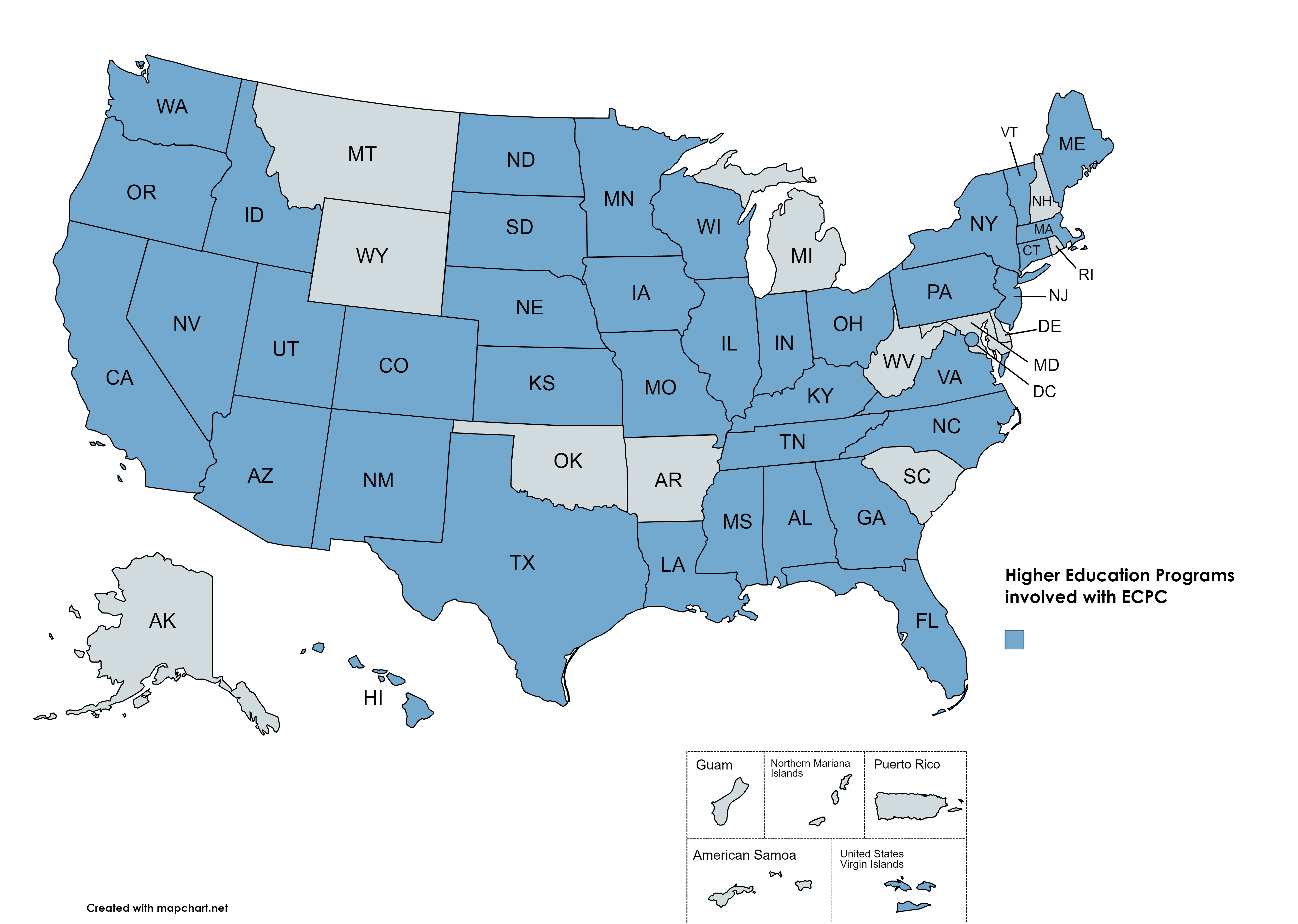
Enhancing pre-service learning systems in early childhood intervention.
- Align programs of study to state and national professional organization personnel standards and the Cross-Disciplinary Competencies
- Integrate Division for Early Childhood Recommended Practices (RP) into programs of study
- Use evidenced-based adult learning practices in IHE programs of study
- Address other identified areas needed to prepare and support a high-quality ECI workforce to improve outcomes of infants and young children with disabilities and their families through the delivery of high-quality services in inclusive settings

ECPC Curriculum Modules – Link to the EI/ECSE Standards
Link to: ECPC Curriculum Modules: Professional Standards
The Early Interventionist/Early Childhood Special Educator (EI/ECSE) Standards represent the first standards to focus specifically on the preparation of professionals who work with young children ages birth through 8 who have or are at-risk for developmental delays and disabilities and their families, across home, classroom and community settings. These Standards build on the history of EI/ECSE as an integrative but unique field of study, policy, research, and practice and emphasize the unique skills and knowledge required for specialization in working with young children and their families.
- Standard 1: Child Development and Early Learning
- Standard 2: Partnering with Families
- Standard 3: Collaboration and Teaming
- Standard 4: Assessment Processes
- Standard 5: Application of Curriculum Frameworks in the Planning of Meaningful Learning Experience
- Standard 6: Using Responsive and Reciprocal Interactions, Interventions, and Instruction
- Standard 7: Professionalism and Ethical Practice
ECPC Curriculum Planning Tool - EI/ECSE Standards
The intended use of the ECPC Curriculum Planning Tool is to provide higher education faculty a tool to develop initial Early Intervention/Early Childhood Special Education (EI/ECSE) programs and blended Early Childhood Education (ECE) and ECSE programs aligned with personnel preparation standards and recommended practices and to ensure that the standards and recommended practices are embedded within and throughout the curriculum. The development of the ECPC curriculum planning tool was driven by the EI/ECSE Practice-based Professional Preparation Standards aligned with the DEC Recommended Practices (RPs) (2014). You will find each EI/ECSE Standard as a separate tab on the tool. This is a downloadable excel file and should be personalized to meet the needs of your EI/ECSE or blended ECE/ECSE program. The tabs represent Standards in early childhood special education and are not intended to represent single courses within an EI/ECSE program.
IHE Tools for Program and Course Revision or Development
ECPC Adult Learning Planning Tool
The ECPC Adult Learning Planning Tool is for use by higher education faculty and professional development providers when planning and implementing a topic/content/practice. These seven evidence-based adult learning practices derived from a meta-synthesis of 15 research reviews of professional development which included 550 studies and 50,000 teachers and practitioners (Dunst, Bruder, & Hamby, 2015).
The intended use of the ECPC Curriculum Planning Tool is to provide higher education faculty a tool to develop initial Early Intervention/Early Childhood Special Education (EI/ECSE) programs and blended Early Childhood Education (ECE) and ECSE programs aligned with personnel preparation standards and recommended practices and to ensure that the standards and recommended practices are embedded within and throughout the curriculum. The development of the ECPC curriculum planning tool was driven by the EI/ECSE Practice-based Professional Preparation Standards aligned with the DEC Recommended Practices (RPs) (2014). You will find each EI/ECSE Standard as a separate tab on the tool. This is a downloadable excel file and should be personalized to meet the needs of your EI/ECSE or blended ECE/ECSE program. The tabs represent Standards in early childhood special education and are not intended to represent single courses within an EI/ECSE program.
ECPC Program of Study Self-Assessment Checklist
This checklist is designed for program self-assessment for an Early Intervention/Early Childhood Special Education (EI/ECSE) or a blended Early Childhood Education and EI/ECSE curriculum or program of study at an approved Institution of Higher Education (IHE).
This checklist includes eight sections typically included in course syllabi and is designed to facilitate alignment of the course content and requirements with the EI/ECSE standards and components.
Course Development and Curriculum Resources: DEC Specialty Set and CEC Standards (*PRIOR* to 2020)
*DEC Specialty Set and CEC Standards (PRIOR* to 2020)
- Crosswalks of the Division for Early Childhood (DEC) Recommended Practices
The crosswalks are designed to assist faculty and professional development providers in identifying the intersection of the DEC Recommended Practices with the CEC and NAEYC Standards as well as the DEC knowledge and skill statements. The crosswalks provide a resource to facilitate the integration of the DEC Recommended Practices by higher education faculty and professional development providers into course/workshop activities, assignments, and fieldwork.
- Curriculum Planning Tool CEC standards
The intended use of the ECPC Curriculum Planning Tool is to provide higher education faculty a tool to develop initial Early Intervention/Early Childhood Special Education (EI/ECSE) programs and blended Early Childhood Education (ECE) and ECSE programs aligned with personnel preparation standards and recommended practices and to ensure that the standards and recommended practices are embedded within and throughout the curriculum. The development of the ECPC curriculum planning tool was driven by the CEC Initial Special Education Professional Preparation Standards (2012), the DEC Initial Specialty Set: ECSE/EI knowledge and skill statements, and the NAEYC Professional Preparation Standards (2010), aligned with the DEC Recommended Practices (RPs) (2014). You will find each DEC RP as a separate tab on the tool. A crosswalk for each Recommended Practice within the Recommended Practices topical areas was developed and is located on the Early Childhood Personnel Center website. Given the methodological procedure for these crosswalks, not all personnel standard elements are included. The Leadership practices have not yet been included in the crosswalk.
This is a downloadable excel file and should be personalized to meet the needs of your EI/ECSE or blended ECE/ECSE program. The tabs represent topics in early childhood special education and are not intended to represent single courses within an EI/ECSE program.
- ECPC Sample Syllabus - Assessment.DOCX
This sample syllabus provides ideas, resources, activities, readings, and assignments, aligned with personnel preparation standards and recommended practices. Consider state and university policies and add them as appropriate. This is an example only and is not a complete syllabus.
- Personnel Standards Alignment
These alignments were done to assist higher education faculty and professional development staff to align their curricula with knowledge and skills and standards for early childhood special educators who serve infants and young children and their families.
- Cross-Disciplinary Competencies
Representatives from each of the seven professional organizations reviewed the competency areas and sub-areas and presented these core competency areas for approval to each of their respective organizations. American Occupational Therapy Association (AOTA); the American Physical Therapy Association (APTA); the American Speech-Language-Hearing Association (ASHA); the Council of Exceptional Children (CEC) and the Division of Early Childhood (DEC), the National Association for the Education of Young Children (NAEYC); and ZERO TO THREE.- Case Studies
- Articles
Case studies and articles illustrate the cross-disciplinary competencies and are for use by Higher Education faculty and Professional development staff.
- DEC Recommended Practices

The DEC Recommended Practices provide guidance to practitioners and families about the most effective ways to improve the learning outcomes and promote
the development of young children, birth through five years of age, who have or are at-risk for developmental delays or disabilities. The DEC Recommended Practices are based on the best available empirical evidence as well as the wisdom and experience of the field.
Course Development and Curriculum Resources: *NEW* EI/ECSE Standards (approved 2020)
*NEW* EI/ECSE Standards (approved 2020)
ECPC Curriculum Planning Tool - EI/ECSE Standards
The intended use of the ECPC Curriculum Planning Tool is to provide higher education faculty a tool to develop initial Early Intervention/Early Childhood Special Education (EI/ECSE) programs and blended Early Childhood Education (ECE) and ECSE programs aligned with personnel preparation standards and recommended practices and to ensure that the standards and recommended practices are embedded within and throughout the curriculum. The development of the ECPC curriculum planning tool was driven by the EI/ECSE Practice-based Professional Preparation Standards aligned with the DEC Recommended Practices (RPs) (2014). You will find each EI/ECSE Standard as a separate tab on the tool. This is a downloadable excel file and should be personalized to meet the needs of your EI/ECSE or blended ECE/ECSE program. The tabs represent Standards in early childhood special education and are not intended to represent single courses within an EI/ECSE program.
ECPC Adult Learning Planning Tool with Examples
ECPC Adult Learning Planning Tool
The ECPC Adult Learning Planning Tool is for use by higher education faculty and professional development providers when planning and implementing a topic/content/practice. These seven evidence-based adult learning practices derived from a meta-synthesis of 15 research reviews of professional development which included 550 studies and 50,000 teachers and practitioners (Dunst, Bruder, & Hamby, 2015).
Cross-Disciplinary Competencies
Representatives from each of the seven professional organizations reviewed the competency areas and sub-areas and presented these core competency areas for approval to each of their respective organizations. American Occupational Therapy Association (AOTA); the American Physical Therapy Association (APTA); the American Speech-Language-Hearing Association (ASHA); the Council of Exceptional Children (CEC) and the Division of Early Childhood (DEC), the National Association for the Education of Young Children (NAEYC); and ZERO TO THREE.
- Case Studies
- Articles
Case studies and articles illustrate the cross-disciplinary competencies and are for use by Higher Education faculty and Professional development staff.
Crosswalk of the EI/ECSE Standards (2020) with DEC RPs (2014)
Crosswalk of the Initial Practice-Based Professional Preparation Standards EI/ECSE (2020) and the DEC Recommended Practices (2014)
Crosswalk of the EI/ECSE (2020) and ECE Standards (2020)
Crosswalk of the Initial Practice-Based Professional Preparation Standards EI/ECSE (2020) and the Professional Standards and Competencies for ECE (2020)
ECPC Curriculum Planning Tool - EI/ECSE Standards
The intended use of the ECPC Curriculum Planning Tool is to provide higher education faculty a tool to develop initial Early Intervention/Early Childhood Special Education (EI/ECSE) programs and blended Early Childhood Education (ECE) and ECSE programs aligned with personnel preparation standards and recommended practices and to ensure that the standards and recommended practices are embedded within and throughout the curriculum. The development of the ECPC curriculum planning tool was driven by the EI/ECSE Practice-based Professional Preparation Standards aligned with the DEC Recommended Practices (RPs) (2014). You will find each EI/ECSE Standard as a separate tab on the tool. This is a downloadable excel file and should be personalized to meet the needs of your EI/ECSE or blended ECE/ECSE program. The tabs represent Standards in early childhood special education and are not intended to represent single courses within an EI/ECSE program.
- Sample Syllabus Standard 1 Child development
- Sample-Syllabus Standard 2 Partnering-with-Families
- Sample Syllabus Standard 3 Collaboration and Teaming
- Sample Syllabus Standard 4 Assessment Processes
- Sample Syllabus Standard 5 Curriculum Frameworks
- Sample Syllabus Standard 6 Using Responsive and Reciprocal Interactions Interventions and Instruction Part 1(components 6.1, 6.3, 6.6, 6.7)
- Sample Syllabus Standard 6 Using Responsive and Reciprocal Interactions Interventions and Instruction Part 2(components 6.2, 6.5)
- Sample Syllabus Standard 6 Using Responsive and Reciprocal Interactions Interventions and Instruction Part 3(components 6.2. 6.4)
- Sample Syllabus Standard 7 Professionalism and Ethical Practice
These sample syllabi provide ideas, resources, activities, readings, and assignments, aligned with the Initial Practice-Based Standards for Early Interventionists/Early Childhood Special Educators (2020) and DEC Recommended Practices (2014). Consider state and university policies and add them as appropriate. This is an example only and is not a complete syllabus.
![]()
The DEC Recommended Practices provide guidance to practitioners and families about the most effective ways to improve the learning outcomes and promote the development of young children, birth through five years of age, who have or are at-risk for developmental delays or disabilities. The DEC Recommended Practices are based on the best available empirical evidence as well as the wisdom and experience of the field.
E-Learning and CONNECT Resources
- E-Learning and CONNECT Resources
E-learning lessons, practice guides, resources, and link to CONNECT Modules
Each learning series has an introduction, practice illustration and implementation activities and resources.
Grant Writing Tools
Interdisciplinary Preparation in Special Education, Early Intervention, and Related Services for Personnel Serving Children with Disabilities who Have High-Intensity Needs (Assistance Listing Number/CFDA 84.325K)
This application packet contains information and the required forms for you to use in submitting a new application for funding under one program authorized by the Individuals with Disabilities Education Act (IDEA).
Use this ECPC checklist to consider the grant elements of your application that will be reviewed and scored.
The Office of Special Education and Rehabilitative Services, Department of Education has announced a new personnel preparation funding opportunity. Use this ECPC planning guide to prepare your application for the Personnel Development to Improve Services and Results for Children with Disabilities: Interdisciplinary Preparation in Special Education, Early Intervention, and Related Services for Personnel Serving Children with Disabilities Who Have High-Intensity Needs (CFDA 84.325K) Focus Area A: Preparing Personnel to serve infants, toddlers, and preschool-age children with disabilities who have high-intensity needs. Applications are due June 22, 2021.
Preparation of Special Education, Early Intervention, and Related Services Leadership Personnel (Assistance Listing Number/CFDA 84.325D)
This application packet contains information and the required forms for you to use in submitting a new application for funding under one program authorized by the Individuals with Disabilities Education Act (IDEA).
Use this ECPC checklist to consider the grant elements of your application that will be reviewed and scored.
The Office of Special Education and Rehabilitative Services, Department of Education has announced a new personnel preparation funding opportunity. Use this ECPC planning guide to prepare your application for the Personnel Development to Improve Services and Results for Children with Disabilities: Preparation of Special Education, Early Intervention, and Related Services Leadership Personnel (CFDA 84.325D) Program. Applications are due June 7, 2021.
Resources to assist with Grant writing:
The intended use of the ECPC Curriculum Planning Tool is to provide higher education faculty a tool to develop initial Early Intervention/Early Childhood Special Education (EI/ECSE) programs and blended Early Childhood Education (ECE) and ECSE programs aligned with personnel preparation standards and recommended practices and to ensure that the standards and recommended practices are embedded within and throughout the curriculum. The development of the ECPC curriculum planning tool was driven by the EI/ECSE Practice-based Professional Preparation Standards aligned with the DEC Recommended Practices (RPs) (2014). You will find each EI/ECSE Standard as a separate tab on the tool. This is a downloadable excel file and should be personalized to meet the needs of your EI/ECSE or blended ECE/ECSE program. The tabs represent Standards in early childhood special education and are not intended to represent single courses within an EI/ECSE program.
Representatives from each of the seven professional organizations reviewed the competency areas and sub-areas and presented these core competency areas for approval to each of their respective organizations. American Occupational Therapy Association (AOTA); the American Physical Therapy Association (APTA); the American Speech-Language-Hearing Association (ASHA); the Council of Exceptional Children (CEC) and the Division of Early Childhood (DEC), the National Association for the Education of Young Children (NAEYC); and ZERO TO THREE.
Crosswalk of the Initial Practice-Based Professional Preparation Standards EI/ECSE (2020) and the DEC Recommended Practices (2014)
Crosswalk of the Initial Practice-Based Professional Preparation Standards EI/ECSE (2020) and the Professional Standards and Competencies for ECE (2020)
Resources for Remote Teaching
Institutes of Higher Education involved with ECPC



